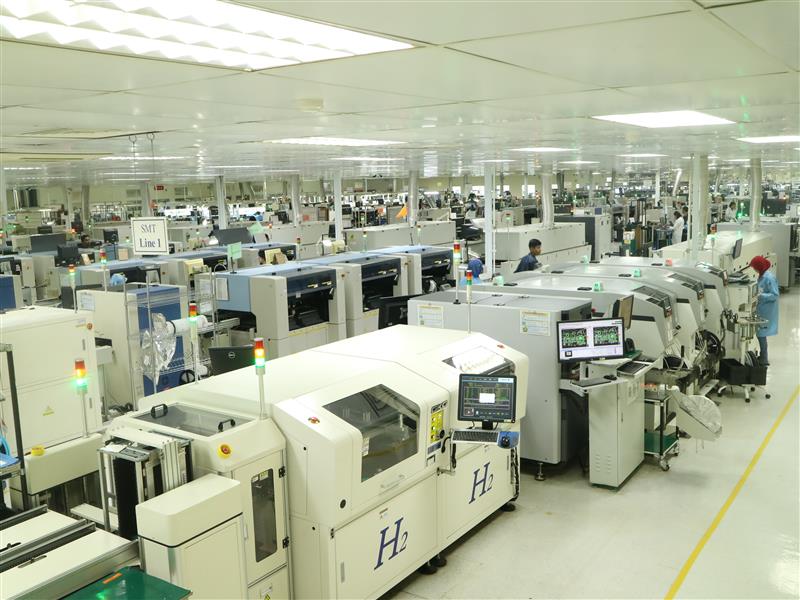Manufacturing operations have always needed to balance throughput with quality and yield, especially in the electronics industry. High throughput has always been achieved through greater automation of manual processes, reduction of downtime through maintenance, and standardization of processing steps. However, not all components can be easily mounted in an automated fashion without more advanced processing and placement equipment. In these cases, electronics manufacturers must use manual placement and soldering to mount odd-shaped components.
PCI has always strived to implement cutting-edge operations and processes with the goal of ensuring customers received the highest quality products. As the company has continued its digital transformation, PCI has implemented a cloud-enabled operations infrastructure that integrates its processing equipment with digitized plant maintenance and order workflow systems. These systems and many others are being implemented as part of PCI’s focus on greater automation and digital transformation, ultimately helping its customers stay competitive.
Plant Processing and Maintenance Digitization at PCI
PCI’s digital transformation initiatives and Smart Factory program have focused on integrating disparate systems, spanning processing equipment, administrative systems, and ERP systems. PCI’s modernized IT architecture links processing equipment and administrative systems with an integrated digital workflow system as part of its digital transformation initiatives. A smart digital workflow helps ensure high throughput processing, uptime through intelligently planned maintenance, and an expedited approval process through a fully digital workflow.
Increased Throughput in Placement and Assembly
 PCB assembly comprises multiple steps, including the application of solder paste, component placement, a soldering process, and automated inspection processes to verify product quality. Manual assembly is also slow, which reduces throughput and delays the delivery of finished products to customers. Increasing throughput in manual assembly requires hiring more workers, which further increases costs and affects customer competitiveness.
PCB assembly comprises multiple steps, including the application of solder paste, component placement, a soldering process, and automated inspection processes to verify product quality. Manual assembly is also slow, which reduces throughput and delays the delivery of finished products to customers. Increasing throughput in manual assembly requires hiring more workers, which further increases costs and affects customer competitiveness.
In addition to adding costs and reducing throughput, manual assembly processes depend entirely on the skill of the worker performing the placement and soldering steps. Manual placement and soldering can be inconsistent between assemblies and between workers. Manual assembly by unskilled workers can also create defects that reduce the reliability and lifetime of the PCBA, something unacceptable in many industries and markets. In the end, it is more difficult for the EMS provider to ensure quality and for customers to remain competitive.
One of PCI’s most recent processing equipment upgrades includes developing an AI-enabled mounting system that can accommodate non-standard components. Examples of such non-standard components include mechanical elements, unique connectors, heat sinks, and semiconductors in proprietary packaging. This robotic system provides the same throughput expected from a typical pick-and-place machine but with the flexibility needed to accommodate unique components that would normally be hand-assembled.
Plant Maintenance Digitization
EMS providers aim to maintain high throughput during fabrication and assembly, requiring a periodic maintenance schedule to ensure uptime. High-volume EMS providers need perpetual uptime for a broad range of equipment, which requires a dedicated maintenance team and schedule to prevent disruptions to customer orders. As facilities and number of machines increase in size, so does the complexity of maintenance planning and scheduling.
PCI’s digital infrastructure now integrates data from processing equipment into a centralized predictive maintenance system. PCI’s system provides visibility into plant maintenance requirements and expedites important activities without manual approvals. By tracking and recording trends, plant managers will address issues before they lead to catastrophic failure. By focusing on engineers’ manual labor, the company has realized real productivity gains and prevented additional costs due to idle operators during downtime.
Digital Workflow
Administrative processes require input at multiple management levels, ranging from approval of purchases to tracking orders and fulfilment statuses. Rather than being dependent on manual forms and approval processes to track and execute maintenance activities, it’s preferable to track and organize administrative approvals through a centralized system that provides complete visibility.
PCI’s digital workflow system has helped the company expedite its internal approval processes in areas ranging from maintenance to purchasing and fulfilment. By eliminating manual tasks and forms, PCI has eliminated many errors associated with manual entry across functional areas in the company. Because so many administrative decisions can delay production, streamlined digitally-enabled management and approvals system helps ensure maximum productivity, minimized downtime, and higher quality.
PCI’s Focus on Increased Automation
The electronics industry is highly competitive, and PCI is committed to helping its customers stay at the cutting edge through advanced technology and greater process automation. PCI’s new processing systems and digitized infrastructure have been implemented to ensure customers stay competitive and receive the highest quality products. PCI’s other capital equipment implementation efforts and broader Smart Factory efforts have helped increase efficiency and cost savings for customers by creating a complete digital workflow that touches all areas of the business. Further implementation of advanced processing equipment and integration with its cloud-enabled management systems are planned for 2022.
Companies that want to bring their new products to market should partner with an experienced EMS provider that brings extensive design, engineering, and process automation experience. PCI’s focus on process automation and digital transformation is already benefiting its customers in a highly competitive industry. We have more than 30 years of EMS experience focused in consumer goods, industrial, automotive, and medical devices, as well as in Printed Circuit Board Assembly (PCBA) and box builds. Our Lean Six Sigma manufacturing expertise enables us to customize our manufacturing line to meet our partners’ requirements.
If needed, we provide our customers with the flexibility needed to scale production as needs arise quickly. We provide our partners with high-quality products at lower manufacturing costs thanks to our shorter change-over time and leaner material control. Contact PCI today to learn more about our capabilities.